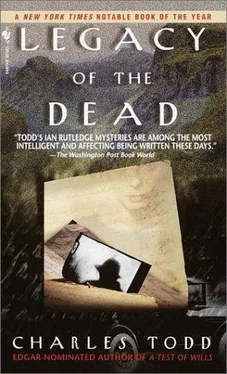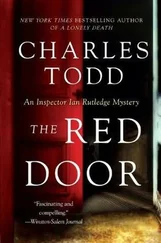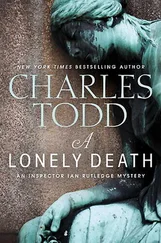Charles Todd - Legacy of the Dead
Здесь есть возможность читать онлайн «Charles Todd - Legacy of the Dead» весь текст электронной книги совершенно бесплатно (целиком полную версию без сокращений). В некоторых случаях можно слушать аудио, скачать через торрент в формате fb2 и присутствует краткое содержание. Жанр: Полицейский детектив, на английском языке. Описание произведения, (предисловие) а так же отзывы посетителей доступны на портале библиотеки ЛибКат.
- Название:Legacy of the Dead
- Автор:
- Жанр:
- Год:неизвестен
- ISBN:нет данных
- Рейтинг книги:5 / 5. Голосов: 1
-
Избранное:Добавить в избранное
- Отзывы:
-
Ваша оценка:
- 100
- 1
- 2
- 3
- 4
- 5
Legacy of the Dead: краткое содержание, описание и аннотация
Предлагаем к чтению аннотацию, описание, краткое содержание или предисловие (зависит от того, что написал сам автор книги «Legacy of the Dead»). Если вы не нашли необходимую информацию о книге — напишите в комментариях, мы постараемся отыскать её.
Legacy of the Dead — читать онлайн бесплатно полную книгу (весь текст) целиком
Ниже представлен текст книги, разбитый по страницам. Система сохранения места последней прочитанной страницы, позволяет с удобством читать онлайн бесплатно книгу «Legacy of the Dead», без необходимости каждый раз заново искать на чём Вы остановились. Поставьте закладку, и сможете в любой момент перейти на страницу, на которой закончили чтение.
Интервал:
Закладка:
I have heard horrid gossip about a young woman in Duncarrick… It is sad that no one has spoken a word in her defense… I will lose my place if I tell you how I met her… Her given name was Fiona… It was the late summer of 1916… She was traveling with a very young baby and had no milk for him… It struck me that she could not be the mother, and indeed, I learned that the mother had just died and she had been given the baby to raise as her own… I was distressed for her, because she was unwed and had no family except for an elderly spinster aunt… When I asked her if the mother had any family who could help, she began to cry, and wouldn’t tell me how the poor creature had died or even where she had been buried… She told me fiercely that she would be a good mother and would not allow anyone to take the boy from her… I could see that she was very agitated… She was always looking over her shoulder as if expecting to see someone there. But there was no one… I soon gave up trying to reason with her… What struck me was her unshakable belief that she could bring up this poor orphan as her son… I cannot be convinced that she would turn wanton and betray the trust that had been placed in her… Please, do what you can on her behalf… It isn’t right for her to be tormented in this way… I would as soon believe that Fiona was a murderer as believe she has become a whore…
He had even read it a second time, finding the wording and the sense of it more interesting than the content. “And you never discovered who’d written this?”
“No, sir, though we made every effort. It came from Glasgow, but there’s no telling who had put it in the post box there. It doesn’t quite say that the mother of the boy was murdered, you see. But if the death was natural, surely there would have been a doctor in attendance-relatives notified? And Fiona should have been able to tell us where to find such witnesses! Instead there’s a mystery about where and how the child was born. She won’t say. She won’t tell us where the mother is buried, if it’s true that she’s dead.”
“But that’s knowledge after the fact. What convinced the Chief Constable that there ought to be some investigation into the matter? Merely the letter? Or was there more?”
“I’ve never been offered an answer to that.” McKinstry tugged at his earlobe, uncertain. He’d never considered the question himself. Orders were orders.
Rutledge had said, “After all, it began as a moral issue. Whether or not the accused was what she claimed to be, a decent widow with a child to raise on her own. And Mr. Elliot chose to do nothing about it. An admission that he had reason to believe the first letters were telling the truth?”
It would be damning.
McKinstry shook his head. “I can’t say. The Chief Constable summoned Inspector Oliver, and then Inspector Oliver sent me to search the premises, and I did. There was nothing out-of-the-way in the living quarters or the inn. The stables were a public place, I couldn’t see a body being buried out there, even in the dead of night. Any work would have been noticed straightaway by the handyman. But Inspector Oliver prides himself on being thorough, and he had the place apart. That’s when he found the bones in the back of a cupboard that had been walled up. It dumbfounded the lot of us, I can tell you!”
“And he believed he’d found the body of the child’s mother?”
“Oh, yes. There was long hair on the skull. I was sent to summon Dr. Murchison, and he came at once, then told Inspector Oliver he’d been brought out of his surgery on a wild-goose chase. The bones were not a woman’s. They belonged to a man. And they were all of a hundred years old!”
8
Walking back through Duncarrick’s main square, Rutledge stopped and considered the shops and houses lining either side of the road. These townspeople were prosperous enough, as Hamish had pointed out, but without obvious signs of wealth. Surely a small inn on the outskirts of town would offer neither problem nor competition. If The Reivers provided extra rooms to people on market day, so much the better. As for competing with the only hotel, Rutledge doubted if it could hold a candle to the amenities offered there. It would have served a simpler class of person who couldn’t afford the grandness of The Ballantyne. And any success it had enjoyed would have been modest in comparison to this part of the town. A good living for the owners, yes, but hardly extravagant.
He moved on, watching people going about their daily lives. Women entering and leaving the shops, a nursemaid with a pram carefully maneuvering it through the door of a house, a woman sweeping her front step, a small boy playing with a top, men in dark suits coming out of offices, others in work clothes, carrying the tools of a trade, a crocodile of schoolgirls marching in the wake of a schoolmistress wearing a thick coat and unbecoming hat.
Ordinary people, their eyes avoiding those of the stranger passing them. No curiosity about his presence or his business. As if once burned, twice shy…
Hamish said, “McKinstry was right. They’re a dour lot!”
There was one other common feature among them. Un-smiling faces and thin, tight mouths. As if life was a burden, and they were used to enduring it.
A woman stepped out of a shop close to where he was standing and cast a surreptitious glance in his direction.
Hamish saw her before he did, commenting that she could have studied him just as clearly from the front window. A tall woman, pretty in a severe way, with her hair in a tightly confined bun, her sweater and skirt a very prim gray with only a touch of color in the silk shirtwaist, a paisley of peach and gray and white.
She made a fuss over the potted plants that stood on either side of the shop door. They were pretty, a mixture of rose geraniums and something lavender and white, like pansies. Satisfied, she turned and went quickly back inside. He looked at the neatly painted sign above the door. A. TAIT MILLINERY. He filed it away for future reference. If she had been interested enough to inspect a stranger, she might also be a gossip…
Rutledge retrieved his car from The Ballantyne’s yard and drove out past the church. He found The Reivers again and stopped across the road to look at it. Yes, he’d been right. Comfortable, decent-hardly a blot on the conscience of Duncarrick. Neither a wild tavern nor a seedy lodging.
Small and long, no more than two stories with an attic above, the inn was one of those old buildings that survived because they were in nobody’s way-no one wanted to build a square here, or shops, or a large house.
Duncarrick’s main square, on the other hand, had probably seen the demise of a whole street of houses to widen the space to suit nineteenth-century builders with Progress on their minds.
The houses on either side here and down the lane by the inn’s stables were neither picturesque nor ugly, more a reflection of the straightforwardness of the people who lived in them. Only the house to one’s left facing the inn was by any measure grand, boasting three stories and an extension toward the rear, as if it had grown over the years with the family living there. The windows had been set with some eye to symmetry and style, lending a faint touch of grace.
The inn looked rooted in its earth, tidy, freshly whitewashed in the past year, the door to the bar hidden behind a climbing rose that had spread with age to cover the porch it had been intended to adorn. It was a hardy rose to survive in this climate, and the small garden at its feet showed some care for the impression the inn made on passersby. The bar parlor, on the side facing the narrow lane into the inn yard at the rear, had a green door, and crisp white curtains showed behind the windows next to it.
Читать дальшеИнтервал:
Закладка:
Похожие книги на «Legacy of the Dead»
Представляем Вашему вниманию похожие книги на «Legacy of the Dead» списком для выбора. Мы отобрали схожую по названию и смыслу литературу в надежде предоставить читателям больше вариантов отыскать новые, интересные, ещё непрочитанные произведения.
Обсуждение, отзывы о книге «Legacy of the Dead» и просто собственные мнения читателей. Оставьте ваши комментарии, напишите, что Вы думаете о произведении, его смысле или главных героях. Укажите что конкретно понравилось, а что нет, и почему Вы так считаете.












